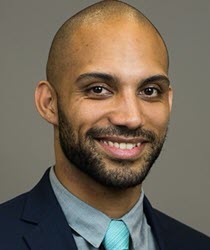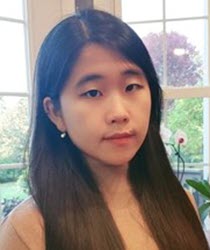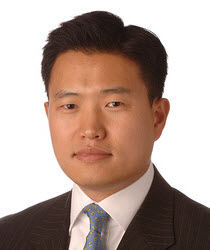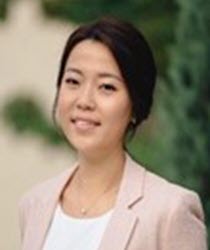October 2020 NextGen Leaders Security Delegation
October 15–December 10, 2020
The October 2020 Security Delegation of the U.S.-ROK Next Generation Leaders Program (NextGen) included fifteen rising Asia policy professionals and was one of the inaugural virtual delegations to connect the U.S. and Republic of Korea (ROK) policy communities while navigating the risks of the Covid-19 pandemic. Led by John Park (Harvard University), with the assistance of NBR’s Alison Szalwinski, Julia Oh, Melissa Newcomb, and Olivia Truesdale, participants met with U.S. and South Korean government officials to discuss security issues and South Korean foreign policy.
At the mid-October kickoff meeting for the Security Delegation, delegation participants were introduced to NBR and KF programs, and Senior Expert John Park shared background information on US-ROK security issues with participants. Delegation participants also had the opportunity to introduce themselves and become acquainted with their cohort.
The delegation met first with the U.S. Embassy in Seoul’s country team, consisting of Ambassador Harry Harris, senior adviser Shaun Kim, and Embassy section heads. At the briefing, participants learned about key issues in U.S.-ROK relations, including challenges in the bilateral relationship and U.S. policy toward South Korea and Asia, as well as public opinion regarding the U.S.-ROK alliance.
The Security Delegation also met with the nonprofit organization Liberty in North Korea (LiNK) in late October. The delegations met with South Korea director Sokeel Park and North Korean defector and Korea University student Geum Hyok Kim to discuss human rights in North Korea and inter-Korean relations. Points of discussion included DPRK government enforcement of ideological and isolationist policies and ways individuals evade these controls to bring information, goods, and money into the DPRK.
The third Security Delegation briefing was with the United States Forces Korea (USFK) and was led by Vice Admiral Stuart Campell Mayer, who serves as the Deputy Commander of the United Nations Command. VADM Campbell Mayer was joined by four of his colleagues: North Korea analyst Joseph M. Monette, Deputy Director of Operation COL John V. Bartoli, COL Shawn P. Creamer of the finance and policy unit, and Michael M. Bosack of the Military Armistice Commission. At the briefing, the delegation participants learned about the USFK command structure, the Korean Armistice Agreement, and important defense and security issues in Asia.
Following the U.S. presidential election, Laura Bicker (BBC), Dr. John Delury (Yonsei University), Dr. Jiyoon Kim (Korean TV network TBS FM) and Dr. David Tully (Department of State) met with the Security Delegation for a panel discussion on the implications of the election results for the U.S.-ROK relationship.
In a mid-November joint briefing with the Trade and Economics Delegation, National Assembly member Dr. Jin Park discussed domestic politics, key focus areas in the U.S.-ROK alliance, and the incoming Biden administration’s emphasis on strengthening alliances with program participants. Dr. Park also highlighted legislative diplomacy opportunities between the U.S. Congress and National Assembly.
In late November, the Security Delegation met with Ko Yunju, Director General for North American Affairs at the South Korean Ministry of Foreign Affairs. In the hour-long Q&A session, the delegation participants asked about synergy between ROK and U.S. regional policies, South Korea’s partnerships in Asia, and other foreign policy initiatives.
At the joint wrap-up meeting in December, participants from the trade and security delegations reflected on their experiences and commented on prevalent themes from the program, including the U.S. ROK alliance’s response to diplomatic and security challenges such as North Korea.
In order to incorporate Korean cultural experiences into the virtual program, participants were invited to a virtual movie night in early November where they watched the 2017 film Steel Rain. Participants also received cultural experience baskets with Korean souvenirs, including snacks, skincare products, and beverages, at the end of the program.
DELEGATION
Participants’ titles and institutional affiliations as of the time of the delegation.
Bryce Barros
China Affairs Analyst, German Marshall Fund

Bryce Barros is the China Affairs Analyst at the Alliance for Securing Democracy at the German Marshall Fund. He previously served as an analyst at Kharon researching sanctioned actors and related commercial activities tied to the proliferation of weapons of mass destruction, strategic trade controls, supply chains, and human rights abuses in the Indo-Pacific. Prior to that, he interned at the Long Term Strategy Group researching Sino-American Strategic Competition and the China Britain Business Council researching Chinese market entry for UK and EU companies.
He is a National Committee on U.S.-China Relations member, Truman National Security Project Fellow, Association of Certified Financial Crime Specialists member, Pacific Forum Young Leader, Aspen Security Forum Scholar, and a National Security Education Program David L. Boren Fellow & Scholar.
He holds a BA in Political Science from Norwich University, a MA in International Affairs from Texas A&M University and is an honorary graduate of the Republic of China (Taiwan) Military Academy. Bryce speaks Mandarin Chinese and Japanese and spent nearly two decades specializing in the Indo-Pacific region.
Jessica Drun
Non-Resident Fellow, Project 2049 Institute

Jessica Drun is a Non-Resident Fellow at the Project 2049 Institute, where she conducts research and analysis on a range of security issues pertaining to China and Taiwan. She has also held positions at the National Bureau of Asian Research, the National Defense University, and the Center for Strategic and International Studies. Jessica specializes in cross-Strait relations, Taiwan politics, and U.S.-Taiwan relations and regularly provides commentary on these issues. She has been quoted in The New York Times, The Guardian, BBC Chinese, and the Associated Press and her work has been published in Foreign Policy, the Jamestown Foundation’s China Brief, and the Diplomat. She received her A.B. in International Affairs from the University of Georgia and her M.A. in Asian Studies from Georgetown’s School of Foreign Service and is fluent in Mandarin Chinese.
Connor Fairman
Research Associate, Council on Foreign Relations

Connor Fairman is a research associate in the Digital and Cyberspace Policy program at the Council on Foreign Relations, where he researches digital trade, global cyber operations, U.S.-China tech competition, and cyber norms. Prior to CFR, Connor studied China’s Digital Silk Road and Huawei Safe City initiatives at the Reconnecting Asia program at the Center for Strategic and International Studies.
His writing has been featured in the Diplomat and Net Politics, and he has presented his research on Chinese tech companies in Africa at the Johns Hopkins School of Advanced International Studies China Africa Research Initiative’s annual conference.
Connor is a former David L. Boren Scholar (China, 2015-16) and holds a bachelor’s degree in international relations and Chinese and a master’s degree in computer and information technology from the University of Pennsylvania.
Joshua Fitt
Research Assistant, Center for a New American Security

Joshua Fitt is a Research Assistant with the Asia-Pacific Security Program at CNAS. He focuses on U.S. East Asian security strategy and specializes in Japanese and Korean Peninsular affairs. Fitt has diverse field experience in Asia.
In 2017, he took part in a research trip to South Korea to study issues faced by North Korean defectors that included the rare opportunity to visit a Hanawon resettlement facility. He spent several months in Japan as an earthquake and tsunami disaster relief volunteer with IsraAID in 2016, working in Kumamoto, Iwate, and Miyagi Prefectures, including time as a fisherman’s assistant on the decimated Tohuku coast. After being awarded the Richard U. Light Fellowship in 2015, Fitt attended an immersive Japanese language study program in Tokyo that featured extensive one-on-one instruction.
Before joining CNAS, Fitt was a campaign field organizer during the 2018 midterm elections in the Upper Midwest, where he spoke with thousands of voters about issues ranging from Chinese tariffs to improving the VA hospital system.
He earned his BA in East Asian Studies from Yale University. Fitt’s thesis explored why some ethnic Koreans in Japan choose to affiliate with the pro-DPRK Chosen Soren. He is proficient in Japanese.
Melodie Ha
Consultant, Guidehouse

Melodie Ha is a consultant with Guidehouse’s National Security Sector where she is currently supporting projects at the U.S. Department of State. She is a skilled national security professional with expertise in U.S. defense policy, Chinese military, cybersecurity, and Indo-Pacific issues.
Prior to Guidehouse, she worked at National Defense University, the Center for a New American Security, and Harvard University.
Melodie received an MA in Security Studies from Georgetown University’s School of Foreign Service, and a BA in Political Science and Chinese Language from Wellesley College. She served as a David L. Boren Fellow to Beijing, China in 2017. Melodie is passionate about women and diversity in international security.
Richard J. Haddock
Program Associate, George Washington University

Richard Haddock is currently the Program Associate for the East Asia National Resource Center (NRC) at George Washington University. The NRC is supported by a Title VI grant from the U.S. Department of Education. In this role, Mr. Haddock is primarily responsible for East Asia content development, strategic planning and grant management, liaising with key community and educational stakeholders, and reporting to the Department of Education. He is also a member of the UC Berkeley U.S.-Taiwan Next Generation Working Group, where he is conducting a research project on the current state and future prospects of Taiwan Studies in the United States. He has held positions at the Sigur Center for Asian Studies, the National Democratic Institute, the American Institute in Taiwan, and the U.S. Department of State.
Mr. Haddock is currently pursuing a Ph.D. in Public Policy and Public Administration at GW, focusing on digital democracy and e-governance development in the Asia-Pacific. He holds an M.A. in Asian Studies from the Elliott School, with a concentration on domestic politics and foreign policy of East Asia. He graduated from the University of Central Florida with a B.A. in Political Science and minors in Asian Studies and Diplomacy.
Brian Hart
Research Associate, Center for Strategic and International Studies

Brian Hart is a research associate with the China Power Project at the Center for Strategic and International Studies (CSIS), where he provides data-driven research and analysis on Chinese military, economic, and technological developments. His particular research interests include Chinese foreign and security policy as well as Chinese military modernization and organizational reform. Prior to joining the China Power Project, he conducted research for the Project 2049 Institute, the Freeman Chair in China Studies at CSIS, and Trivium China.
Brian earned his M.A. with honors in China Studies and International Economics from the Johns Hopkins University School of Advanced International Studies (SAIS), where he was awarded the Loe Fellowship for Excellence in China Studies and a Henry A. Kissinger Summer Fellowship. He also received a Graduate Certificate in China Studies from the Hopkins-Nanjing Center in Nanjing, China. He holds a B.A. with honors in Politics and International Affairs from Wake Forest University, where he graduated magna cum laude. He is proficient in Mandarin Chinese.
James Hildebrand
Assistant Director, Atlantic Council

James Hildebrand is assistant director of the Atlantic Council’s Asia Security Initiative, housed within the Scowcroft Center for Strategy and Security. In his role, he helps manage the Initiative’s programming and research, which focus on developing forward-looking strategies and constructive solutions for the most pressing issues affecting the Indo-Pacific region, particularly the rise of China, in order to enhance cooperation between the United States and its regional allies and partners.
Prior to joining the Atlantic Council, James had a visiting fellowship at Doshisha University in Kyoto, Japan and completed a year-long term with AmeriCorps. He received a B.A. in Asian Languages & Civilizations from Amherst College and an M.A. in Security Studies from Georgetown University’s School of Foreign Service.
Olivia Schieber
Senior Program Manager, American Enterprise Institute

Olivia Schieber is the Senior Program Manager of the Foreign and Defense Policy department at the American Enterprise Institute (AEI), where she helps develop and execute the department’s strategic vision as well as conduct independent research and publish on issues related to North and South Korea.
Previously, Ms. Schieber was a Research Assistant at AEI, focusing on US strategy in the Indo-Pacific and was a Policy Research Fellow at the Edwin O. Reischauer Center for East Asian Studies at the Johns Hopkins School of Advanced International Studies, where she conducted research related to energy security and the comparative politics of East Asia.
Ms. Schieber has extensive experience studying and working in East Asia. She also holds a B.A. in East Asian Studies and International Studies from Johns Hopkins University, where she received a Woodrow Wilson Fellowship to conduct an independently designed research project on the South Korean military. Ms. Schieber speaks Mandarin Chinese, Japanese, and Korean. In her spare time, Ms. Schieber is a ballet dancer and dances with local groups in Washington, DC.
Kirt Smith
Research Assistant, Congressional Research Service

Kirt Smith works as a research assistant in the Asia Section at the Congressional Research Service, a unit of the Library of Congress that provides the U.S. Congress with authoritative, nonpartisan research and analysis. Prior to his time at CRS, Kirt worked as a geospatial information systems (GIS) specialist for the Reconnecting Asia Project at the Center for Strategic and International Studies (CSIS), focused on topics related to China’s Belt and Road Initiative and Southeast Asia’s strategic connectivity.
Kirt has spent over 4 years working and studying in several countries around Asia, including Thailand, Japan, China, and two years in Busan, South Korea.
He earned his Master’s of Global Policy Studies from the Lyndon B. Johnson School of Public Affairs at the University of Texas and a B.A. in French from the University of New Orleans. In his free time, Kirt is learning Burmese. He is a former competitive gymnast and continues to train gymnastics when he can.
Nicole Smolinske
Program Manager, U.S. Department of State

Nicole Smolinske is a Program Manager at the Department of State’s Bureau of East Asian and Pacific Affairs, Office of Multilateral Affairs where she focuses on the Mekong region (contractor with Cherokee Nation Businesses). Ms. Smolinske manages foreign assistance programs on water, energy, and food security and the environment; connectivity; education; health; and women’s empowerment associated with the Mekong-U.S. Partnership. She also manages the Third Country Training Program (TCTP), a partnership with Singapore’s Ministry of Foreign Affairs.
Prior, she worked at the International Republican Institute and was the Bridge Award Fellow at the National Bureau of Asian Research where she focused on political and security affairs in Southeast Asia and the South China Sea.
Ms. Smolinske was a 2015/16 Boren Fellow in Chiang Mai, Thailand and serves as the 2020 President of the Boren Forum. She holds a Masters in Southeast Asian Studies from the University of Michigan and received three Bachelor of Arts degrees in Political Science, Asian Studies, and Philosophy from Washington State University, she is a graduate of the Honors College.
Lucy Stevenson-Yang
Program Assistant, United States Institute of Peace

Lucy Stevenson-Yang is the Program Assistant for the China and North Korea teams at the United States Institute of Peace. At USIP, Lucy focuses on how to strengthen diplomacy and support peace and security on the Korean Peninsula. Her research also examines China’s impact on peace and security internationally. Previously, Lucy was a Research Analyst with USIP’s Asia Center, where she supported research projects on topics ranging from Afghanistan’s peace process to China’s impact on conflict dynamics in the Red Sea Arena. Before joining USIP, Lucy had an internship at Amnesty International with the Individuals at Risk team. She was born and raised in Beijing, China.
Lauren Sung
Analyst, Center for Advanced Defense Studies

Lauren Sung is an analyst in the Counterproliferation Cell at C4ADS (Center for Advanced Defense Studies). Lauren’s primary area of research is in North Korean sanctions evasions and vectors of North Korea’s proliferation financing, such as the DPRK’s Illicit supply chains in the maritime domain, production of illegal substances, and money laundering networks. Her other areas of research interest include Chinese military civil fusion policy and Chinese elite asset offshoring. Prior to joining C4ADS, Lauren worked in private sector strategic advisory and compliance consulting where she specialized in Northeast Asian politics, security and international relations, and in-country investigations.
Lauren received her master’s degree in Asian Studies from Georgetown University’s School of Foreign Service, and her bachelor’s degree in Asian and Middle Eastern Studies from the University of Cambridge. She is a fluent speaker of Korean, Japanese, and Chinese.
Maggie Tennis
Master’s in Public Affairs Candidate in International Relations, Princeton University

Maggie Tennis is a Master’s in Public Affairs Candidate in International Relations at Princeton University, where she focuses on national security, U.S.-Russia foreign policy, and arms control. Previously, she worked for Ambassador Strobe Talbott at the Brookings Institution, where her work for The Center on U.S. and Europe focused on U.S.-Russian foreign policy and transatlantic security. Before that, she was a Herbert Scoville Jr. Peace Fellow at the Arms Control Association, working on arms control and nonproliferation. Her work has appeared in Slate, Lawfare, DefenseOne, The National Interest, and The Baltimore Sun, among others. She graduated from Brown University.
Ashley Wood
Policy and Research Associate, National Security Action

Ashley Wood is a foreign policy professional with experience in politics and communications. She is currently a policy and research associate at National Security Action, creating messaging and research products for policy experts and political stakeholders across the Democratic party. Ashley specializes in US-China relations and East Asia more broadly, as well as issues at the intersection of foreign policy and domestic politics.
She has published in The Diplomat, Just Security, and Crooked Media. Previously, Ashley worked in communications at Edelman. Ashley holds a BA in political science from Northwestern University with a minor in creative writing. She is a recipient of the State Department’s Gilman Scholarship and studied abroad in Beijing, China. Ashley is originally from Coral Springs, Florida.
Delegation Leaders
John Park
(Senior Expert)
Director, Korea Project and Adjunct Lecturer in Public Policy, Belfer Center, Harvard Kennedy School

John Park is Director of the Korea Project and Adjunct Lecturer in Public Policy at the Harvard Kennedy School’s Belfer Center. He is also a Faculty Affiliate with the Project on Managing the Atom. Dr. Park’s core research projects focus on the political economy of the Korean Peninsula, nuclear proliferation, economic statecraft, Asian trade negotiations, and North Korean cyber activities.
Dr. Park was the 2012–2013 Stanton Nuclear Security Junior Faculty Fellow at MIT’s Security Studies Program. He previously directed Northeast Asia Track 1.5 dialogues at the U.S. Institute of Peace in Washington, D.C. He advises Northeast Asia policy-focused officials in the U.S. government. Dr. Park worked at Goldman Sachs, where he specialized in U.S. military privatization financing projects. He earlier worked in Goldman Sachs’ M&A Advisory Group in Hong Kong and The Boston Consulting Group’s Financial Services Practice in Seoul.
Dr. Park is a commentator on Asian geopolitical issues on CNN, BBC, CNBC, Fox Business, Fox News, and Bloomberg TV. He also advises institutional investors on geopolitical risk in Asia-Pacific markets.
His key publications include: “Stopping North Korea, Inc.: Sanctions Effectiveness and Unintended Consequences,” (MIT Security Studies Program, 2016 — co-authored with Jim Walsh); “The Key to the North Korean Targeted Sanctions Puzzle,” The Washington Quarterly (Fall 2014); “Assessing the Role of Security Assurances in Dealing with North Korea” in Security Assurances and Nuclear Nonproliferation (Stanford University Press, 2012); “North Korea, Inc.: Gaining Insights into North Korean Regime Stability from Recent Commercial Activities” (USIP Working Paper, May 2009); and “North Korea’s Nuclear Policy Behavior: Deterrence and Leverage,” in The Long Shadow: Nuclear Weapons and Security in 21st Century Asia (Stanford University Press, 2008).
His current research focuses on the North Korean regime’s accumulated learning in evading sanctions. Dr. Park received his M.Phil. and Ph.D. from the University of Cambridge. He completed his pre-doctoral and postdoctoral training at the Harvard Kennedy School’s Belfer Center. Dr. Park has testified on North Korea before the Senate Banking Committee and the House Financial Services Committee.
Alison Szalwinski
(Program Director)
Vice President of Research, The National Bureau of Asian Research

Alison Szalwinski is Vice President of Research at NBR. Ms. Szalwinski provides executive leadership to NBR’s policy research agenda and oversees research teams in Seattle and Washington, D.C.
She is the author of numerous articles and reports and co-editor of the Strategic Asia series along with Ashley J. Tellis and Michael Wills, including the most recent volumes, Strategic Asia 2020: U.S.-China Competition for Global Influence (2020), Strategic Asia 2019: China’s Expanding Strategic Ambitions (2019), and Strategic Asia 2017–18: Power, Ideas, and Military Strategy in the Asia-Pacific (2017). Prior to joining NBR, Szalwinski spent time at the U.S. Department of State and the Center for Strategic and International Studies. Her research interests include U.S. policy toward Asia, especially U.S.-China relations and the implications of great-power competition for U.S. alliances in the region.
She holds a BA in Foreign Affairs and History from the University of Virginia and an MA in Asian Studies from Georgetown University’s Edmund A. Walsh School of Foreign Service. Outside of work, she enjoys outdoor activities, including snowboarding, climbing, and triathlons.
Julia Oh
(Group Rapporteur)
Associate, The National Bureau of Asian Research

Julia Oh is an Associate at National Bureau of Asian Research (NBR) based in Seoul, South Korea. She also is a Senior Project Officer at the National Democratic Institute, Korea. At NBR, Julia provides guidance on Korea Programming, business development, and strategic relationship building. She was previously a resident fellow at NBR’s DC office. Prior to joining NBR, she worked for the South Korean government in London as a Marketing Assistant Manager for the Korea Trade-Investment Promotion Agency. She interned for one year in a separate research role for the Korea Economic Institute of America in DC, and the United Nations office for Disarmament Affairs in NYC. While completing her MA, she contributed to the Centre for Science and Security Studies (CSSS) in London.
Julia holds BA in Communications from University of Delaware and an MA in International Relations from the Department of War Studies at the King’s College London, where her dissertation focused on the role of North Korea’s nuclear weapons program in domestic propaganda.
Melissa Newcomb
(Program Coordinator)
Senior Project and Grants Manager, The National Bureau of Asian Research

Melissa Newcomb is a Senior Project and Grants Manager with the Political and Security Affairs group at NBR. In this position, Ms. Newcomb manages projects related to Taiwan, cross-strait relations, U.S.-China relations, and the Korean peninsula.
Prior to joining NBR, Ms. Newcomb was the Research Manager at the Global Taiwan Institute and Associate Editor of the Global Taiwan Brief. At the Global Taiwan Institute, she created and managed the Civil Society and Democracy Series. She also previously worked at the East-West Center in Washington, D.C.
Ms. Newcomb holds an MA in International Affairs with a focus on East Asia and Conflict Resolution from the School of International Service at American University. She also holds a BA from St. Mary’s College of Maryland with a double major in English Literature and Asian Studies. She enjoys soccer, yoga, and reading sci-fi novels in her free time.
Olivia Truesdale
(Program Assistant)
Intern, Political and Security Affairs, The National Bureau of Asian Research

Olivia Truesdale is a Political and Security Affairs intern at NBR.
She supports publication and project activities such as research, drafting, proofreading, and fact checking.
Prior to joining NBR, Ms. Truesdale was a Nonimmigrant Visa Unit intern at the U.S. Embassy, Seoul and an exchange student at Yonsei University. She studies foreign languages and cultures, specializing in Korean and Spanish, at Scripps College.



